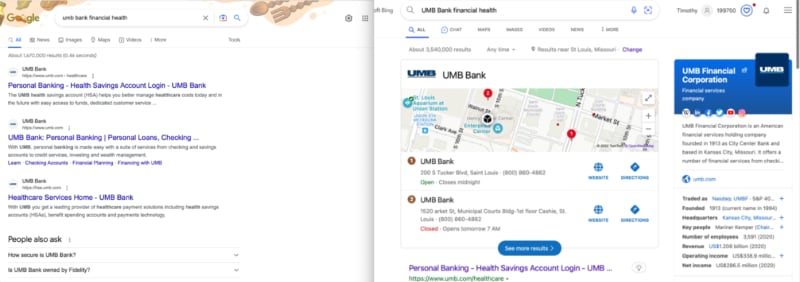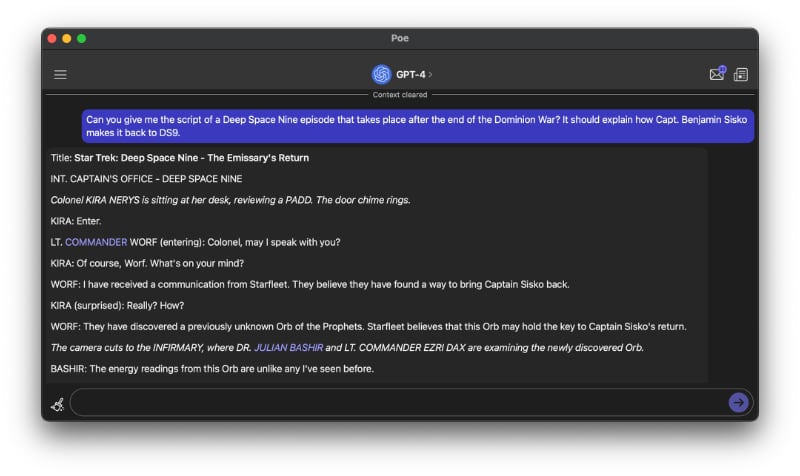
Some level of mainstream machine learning has been present in the lives of ordinary folks like you and me since iPhoto first did facial recognition well over a decade ago. Other AI or AI-like tech has become increasingly pervasive, but quite limited. Now, a flood of “experience this now” machine learning is drowning out past years’ “imagine if this were just a bit better” tech. Two tools to utilize such tech are worth your attention right now.
Out of the almost overwhelming sea of options, Microsoft’s new Bing chatbot and Quora’s Poe stand tall in my estimation. I have written previously about the amazing — if unnerving — quality of Open AI’s ChatGPT, but while that seemed even a few months ago like something largely reserved for enthusiasts like myself, these new tools are ones you can start using today for more than novelty.
The new Microsoft Bing — publicly available without a waitlist starting today — is perhaps the biggest gamechanger for how most of us function today. Internet search is essential to how most of us both work and play and this is a situation where saying someone has “revolutionized” a field is an understatement, not a mere cliché.
I’ve been using Bing over Google for a decade or so now out of the conviction that Google simply had too much power. Ironic as it may be to pick Microsoft, of all companies, in order to support the underdog, Bing is essentially the only decent alternative to Google and it is as much the underdog to Google as the Mac was to Microsoft’s own Windows back in the 1990’s.
(Before the DuckDuckGo fans get in a tizzy, I know it exists, but keep in mind it depends on Bing for its search results.)
Even before the AI enhancements, I tend to find Bing’s layout more useful and better at highlighting information I am looking for. Throw in fewer “sponsored” links (these days many Google pages remind me of how search engines of old looked as Google slowly killed them off) and I’ve been content with my choice. At least relatively.

“SEO spam” clogs the modern search experience with barely legible pages simply designed to appear relevant to Google and Bing. You know the stuff: spammy “how to’s” that are really ads for a particular product, comparison sites that have useless comparisons and essays that simply use filler words so you scroll by miles of ads before realizing the site is useless. Good content is often hidden pages deep in results while barely legible pages simply gathering as many keywords as possible and then placing them in a sea of ads dominate.
This is where Bing’s AI enhancement doesn’t just improve the experience, it utterly upends it.
A month and a half ago, I found myself with chickenpox, something I thought I was immune to, having had it as a child. Sites that were even halfway legitimate on medical information were buried amidst tons of those spammy options.
While Google or normal Bing would bring up some informative resources about rare adult cases with stern wording about the added severity (I can now testify that’s true!), even when I did get to legitimate sites, all spoke of it lasting 10-14 days, which was unnerving as mine passed that mark. Any query about “What if my case of chickenpox lasts longer than expected?” turned up repeats of those sites and more of the spammy ones.
Bing’s chatbot got me the information neither classic Bing nor Google would. It skipped past both the WebMD’s of the world that had the normal — but not unusual — case details and the utter garbage links. Asking it about my continue misery past the 14 day mark, it immediately gave me feedback that included a link to a document from the Australian health department that actually addressed longer lasting chickenpox. The only document I found that addressed it.
Get a result or two like that and you suddenly realize: the chatbot isn’t just a gimmick. It can actually be a serious research tool for finding things in an increasingly messy Internet.
Yes, the New York Times, through persistent coaching, managed to get Bing’s bot to go off the rails, which has surely scared some people away from trying it. Their piece bordered on journalistic malpractice. To persistently try to break a tool’s safety rules and then report that it said some disturbing things is not shocking; if anything, how well it fought the attempts is rather impressive.
When people complain that AI chatbots might produce hateful remarks or might get something terribly wrong, I want to ask: have you searched Google lately?
Objectionable or outright false content gets listed — even towards the top of results — on a regular basis. If we held search results to the same standard people are demanding of these emerging chatbots, Google, Bing and whatever other search engine you want to include (which is almost certainly powered by Google or Bing) are even worse.
Microsoft has also nailed how it presents results from the chat interface. In light of the objections of AI learning models appropriating other people’s ideas, Bing’s chatbot does what has always been held as appropriate when summarizing other people’s ideas: footnoting sources. It presented the data to me that my chickenpox could go longer than 14 days and gave me a linked citation to the source document.
Not just as someone who sometimes wants information, but as a content creator myself, this is about ideal. Sure, some people might see a summary that gleans information I’ve written and never visit Open for Business, but that’s always been true of citations. That’s a necessary risk for ideas to be exchanged in society and one that I think will work out for everyone, as good sources are allowed to rise above the spam and thus ultimately get more notice.
If chatbots never produce single additional useful function beyond better search results, this is huge and quite enough to take the technology from “novel” to “necessary.”
The only thing holding back Bing’s AI search right now is that Microsoft has limited it to users of its Edge web browser. Microsoft will regret squandering its early lead over Google on this technology if it prioritizes an attempt to regain browser market share. The far more crucial and reachable effort for it is to make search more competitive.
As a Safari user, I’ve been impressed enough to load the cutting edge (pun not intended) version of Edge a few times a week to get a search result regular Bing and Google fail to provide, but I’m not interested in upending my browser habits entirely. Microsoft, win back some of the search market; the rest will come in time.
This brings me to the second interesting right now chatbot tool, Quora’s Poe, which I discovered when frustrated I again needed to load Edge just to ask a question.
While I’ve never found Quora itself particularly helpful (it often feels more a part of those useless spammy results that clog up search results), Poe is very well designed. Initially an app for iOS, Android and Mac, the company also launched a web-based version just this week.
Poe is more akin to OpenAI’s ChatGPT interface than the Bing chatbot, since like the former, it lacks access to a live web database. It is useful for asking general knowledge questions, discussing ideas and the like, but not necessarily questions like my peculiar chickenpox one that Bing handled so adroitly.
Unlike OpenAI’s interface, I’ve yet to run into a time Poe turned me away for being overloaded and, unlike Bing’s bot, it’s more willing to have extended conversation and it saves conversation for further follow up between uses. (Bing’s chatbot was able to have extended conversation until those histrionic reports of its output caused Microsoft to clamp further down on its safety mechanisms.)

Interestingly, Poe takes a “chatbot agnostic” approach, with several different bots available from both Microsoft-backed OpenAI and Google-backed Anthropic. Both of those AI developers license their tools for others to build upon and that is what Quora has done with its app.
If you’re looking for a tool to answer general knowledge type questions, glean programming advice, summarize a piece of writing or the like, Poe can do it in a clean, easy to use interface for free.
Quora’s business model for Poe is starting to emerge and gives me hope it might be sustainable. As of today, one can subscribe to a premium account for $199/year after a seven day trial. Much like the $20/month premium ChatGPT+, Poe’s paid version provides immediate access to the latest, most advanced models. The GPT-4 model that Open AI has been dazzling people with this week (and also the enhanced “Claude+” from Anthropic) are limited to just one query a day in Poe’s free edition, while subscribers get hundreds of queries per month. (ChatGPT only offers GPT-4 to paid subscribers, so kudos to Quora for even one free use per day.)
Why subscribe to Poe and not pay for ChatGPT+ directly? Anyone can subscribe to Poe, whereas OpenAI’s own paid interface has a waitlist. Access to Anthropic’s work is also a bonus, as it sometimes gives better — or at least usefully different — responses than OpenAI’s models. If Quora continues to put cutting edge access tools into the paid version of Poe, it will prove a worthwhile subscription.
For most queries, the Bing chatbot or standard version of Poe is adequate for the things you may want to do. Start with those options. However, after spending the afternoon experimenting with GPT-4, it is a notable step forward that could merit an entire column of its own. While Bing’s chatbot is built on GPT-4, given restrictions Microsoft has placed on it, the paid edition of Poe offers a more impressive glimpse into this latest and greatest model.
This realm is changing rapidly, but as of right now, I see Microsoft and Quora’s work as complementary. There is an almost unimagineable range of uses for chatbots that we’re just starting to get a grasp on and Poe is the most delightful interface to those tools I’ve encountered yet. Bing isn’t quite as great as a general chatbot, its massive improvement to the search experience ought to be given a chance even from the most hardened AI skeptic.
Genuinely useful AI is here. You won’t regret trying it.
Full Disclosure: I recently invested a small amount into Microsoft (MSFT) precisely because I was so excited with my experience using Bing’s new technology.

Timothy R. Butler is Editor-in-Chief of Open for Business. He also serves as a pastor at Little Hills Church and FaithTree Christian Fellowship.
You need to be logged in if you wish to comment on this article. Sign in or sign up here.
Start the Conversation